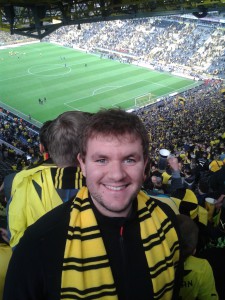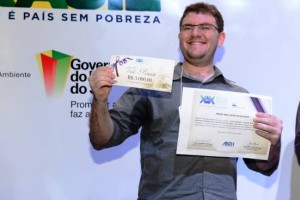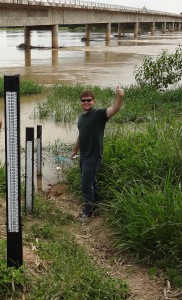Introducing… Fernando Mainardi Fan
For the first ‘Introducing…’ blog post I invited Fernando Mainardi Fan to introduce himself and his work to the HEPEX community. I first met Fernando after the fantastic talk and poster he presented at EGU this year, and I’m pleased that he agreed to answer my questions!
Liz: Hello! Can you introduce yourself in a couple of sentences?
Fernando Mainardi Fan
Fernando: Hello! My name is Fernando Mainardi Fan and I am a PhD student at the Hydraulic Research Institute (IPH) from UFRGS, a university located in the south of Brazil (Porto Alegre city). And actually I am expending a one year period (until December 2014) working with the Institute of Hydraulic Engineering and Water Resources Management (WaWi) from University of Duisburg-Essen, in Germany. The main focus of my research is hydrological forecasting and its operational applications, having as study cases Brazilian large scale basins, where forecasts are generally used for both hydropower production and flood control, and we have some particular conditions related to tropical climate, data availability, watershed scale, multipurpose reservoirs, among others.
Liz: How long have you been doing HEPEX-related work?
Fernando: My first contacts with hydrological forecasting issues started in the year of 2012, as a collaborator in a research project. But I only fully engaged in the topic on 2013, when I started my PhD.
Liz: How and why did you get into it?
Fernando: I was invited to work on a research project related to hydrological forecasting on 2012. Our goal was to set up a forecasting system for a specific basin in Brazil and evaluate results. As the project evolved I got totally involved with it, and a new world of possibilities came to me. I realized that the research related to ensemble forecasting and its potential benefits for Brazil was delayed. With this happening in a place where hydrological forecasts are important inputs (around 80% of the total country energy is hydropower, and a great number of reservoirs is also responsible for flood mitigation). Then I decided: – that is what I want to work with.
Liz: What is the best / worst thing about ensembles?
Fernando: The best things about ensembles… for me is the feeling that they are more honest as forecasts, since we are saying: – this is it, we do not know the future perfectly, but we bet those are the possibilities. The worst thing for me is the large amount of data. As I research large basins it took me a lot of time to process data and run the models. And to set up a forecasting system is also more difficult when you have to handle lots of information.
Liz: What / who inspires you?
Fernando: As I told in the question about how I started to work with ensembles, one thing that inspires me is the great possibilities that I am exploring for the use of ensemble forecasts for inflows of reservoirs and flood mitigation on Brazilian applications.
Recently, also, I saw in the news that a forecasting system that I worked helped to take some decisions related to evacuation of people. This is pretty inspiring! But I know that the modeling and forecasting is just a small part of the process, and this kind of inspires me also, because the challenges do not end with the forecast, but there is much more to be done after it. Research and improvement possibilities are very wide.
Finally, people also inspire me. I always worked with great colleagues and advisors. It is difficult to not feel motivated when you have a nice environment around you.
Liz: What has been the most memorable part of your HEPEX career so far?
Fernando receives the Young Researcher Award of the Brazilian Association of Water Resources (ABRH) in 2013
Fernando: When working in Brazil we sometimes feel disconnected to people doing research in the same topics around the world, because it is not easy to go to international conferences, visit other research centers, meet people and discuss the work. This way, the 2014 year was special for me because I had the opportunity to show my work in a big auditory and meet people in conferences such as EGU. Even my work was published in the HEPEX blog!
Liz: Are there any papers or talks that you want to shamelessly publicise?!
Fernando: Hum… maybe I should use this space to invite people to see my blog post in the HEPEX blog? And also the pages of my research groups in Brazil and Germany, where usually we update with recent publications and developments: Large Scale Hydrology (Brazil) and WaWi (Germany).
Liz: What are you currently working on?
Fernando: In the moment I am working on ensemble forecasts evaluations for multiple case studies using data from the TIGGE archive. As this is being finished, I am starting to use the generated forecasts as inputs for optimization models of reservoirs operation. I am also with some ideas related to ensemble results interpretation and evaluation, that maybe I will follow in the next stages of my research.
Liz: Where would you like your research to take you in the long run?
Fernando: I believe that my researcher career in hydrology is at the first stages, and that I have a lot to improve myself. This way, I hope that my research will give opportunities to develop myself, and maybe someday in the long run I could also inspire other researchers to develop works on water resources and hydrological forecasting related topics.
Liz: What is HEPEX to you?
Fernando: For me HEPEX is a very good idea. The internet page gives you the opportunity to see nice works, and discuss nice issues with people from everywhere having all the convenience of internet. And the presence in conferences and workshops organizes the community that works with hydrological ensemble forecasting. I feel very happy about the existence of the community.
Liz: Where do you think HEPEX will be in 5 years time?
Fernando doing field work
Fernando: As the question is “where”… I propose to do something like a workshop in South America in the next 5 years!
Liz: Are there any meetings / conferences you will be attending where we can say hello to you?
Fernando: This year I will go to the H-SAF and HEPEX workshops on coupled hydrology. Next year I am still not sure, but I am planning to go to the IAHS at IUGG2015 in Prague, or to EGU in Vienna.
Liz: Is there a question that you would like to ask the HEPEX community?
Fernando: Yes! As the topic is “early-career researchers” my question is: – what is the ensemble of basic skills that an early-career researcher needs to develop for working on researches related to HEPEX?



September 12, 2014 at 22:41
Nice post. I enjoyed reading it a lot and appreciate Liz’s initiative.
Thinking of Fernando’s question at the end, I would say that a good score is associated with friendly people, who share their problems but also their solutions with the community!
See you then soon at the H-SAF/HEPEX workshop!
September 15, 2014 at 01:24
For the most important skills for new researchers 1. English communication (written and spoken), 2. Scientific computer programming and 3. Initiative and resourcefulness (e.g. being effective and proactive). I have some more advice here: http://tompagano.blogspot.com.au/2012/03/iranian-students-are-hungry-my-advice.html
Some of what is good for new scientists, is just good for new employees in general, be ambitious, autonomous, upbeat, honest, proactive, organized, good at communication, work well with others.
My adviser gave me two bits of advice- when taking on a new topic, read as much background as you can, even down to the gray/obscure literature. I recommend especially doing this when you’re young because later time will be a scarce resource. He also recommended being able to summarize your work (especially your dissertation) into one sentence. I turned mine into a haiku:
“If only we knew
future precipitation,
we could forecast flow”
I suppose I’d challenge you to try it.
I’d also recommend not being shy about taking up volunteer/leadership positions in professional organizations. It’s a good networking and learning opportunity.
September 16, 2014 at 15:34
Tom’s advice is spot on. I’m about to finalise a PhD project myself and here are some things that worked really well for me (in no particular order):
(1) Write a research design. In the document, you’ll outline what research questions you’ll be addressing and how. Have this approved by your supervisors. This document will be your compass during the project. Obviously you may deviate from the original plan but it’s good to do this consciously.
(2) Make sure you are having fun in what you do. For me, this constituted finding a few people to co-operate with and to discuss my research with. More trivial: make sure you define your research in such a way that you’ll enjoy it. This pertains to the research questions and methods, but also to the tools you’re using.
(3) Try and find a mentor who you can consult on all matters professional, in addition to supervisors who’ll help you with the actual content of your research.
(4) Make sure to make the best of what others have produced: software, tools, templates, etc.
(5) Read up on blogs, books, etc. on other people’s experiences in doing phd projects, and specifically also on how you can *fail* doing a phd.